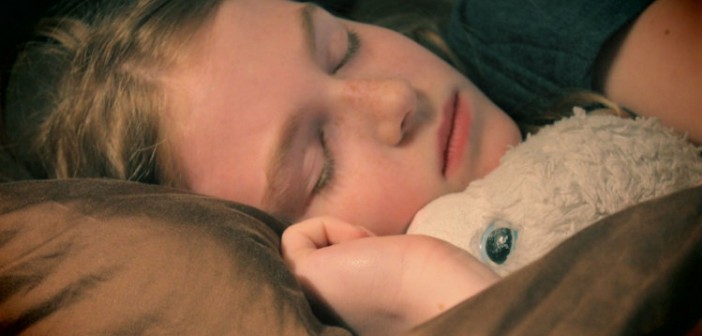I'm at work. The phone rings. The caller ID tells me it's school calling.
"Hello?"
"Hi, Mrs. Urbanski. This is the school nurse."
The upshot: my daughter Rose is sick, and won't I please come pick her up?
Absolutely. I finish up the task I was working on, say goodbye to my coworkers, and head out the door. It takes me longer than I expect to reach school; by the time I arrive, Rose is miserable.
After a big hug with Rose and a word of thanks to the school secretary, my daughter and I trundle off to the car and head home.
I stop to get a few Sick Day essentials: pretzels, chicken noodle soup, white soda.
And then, at last, we're home. PJs go on. Rose flirts with some homework; I start my blog post. Before long, we snuggle up on the sofa bed (which unfolds only for guests or for Sick Days) and watch an episode of Agatha Christie's "Poirot," followed by a little rest time.
This is all very mundane, and you're clever if you're now asking why I would write a blog post about fetching my sick daughter from school. Here's why: As I put the Sick Day machinery into action, I realized how giddy I felt. I grieve whenever my children feel wretched, of course, but I also delight in caring for them in their low times. And then a Scripture passage popped into my head--Matthew 7:9-11:
Which one of you would hand his son a stone when he asks for a loaf of bread, or a snake when he asks for a fish? If you then, who are wicked, know how to give good gifts to your children, how much more will your heavenly Father give good things to those who ask him.
Because my mothering is often clumsy or tainted with selfishness, pouring myself out in single-minded devotion to care for a sick child reminds me how precious parenting is. How God-like. Even I, imperfect as I am, enjoy splendid mothering moments; I rejoice that my heavenly Father is always and everywhere an infintely better parent than I am.
God's tender parenting surpasses all language, thought, and imagery. And yet, Scripture uses our human images of both "mother" and "father" to describe the intimacy of God's care for us. Take Isaiah 66:10-13, for instance:
Rejoice with Jerusalem and be glad because of her,
all you who love her;
Rejoice with her in her joy,
all you who mourn over her
So that you may nurse and be satisfied
from her consoling breast;
That you may drink with delight
at her abundant breasts!
For thus says the LORD:
I will spread prosperity over her like a river,
like an overflowing torrent,
the wealth of nations.
You shall nurse, carried in her arms,
cradled upon her knees;
As a mother comforts her child,
so I will comfort you;
in Jerusalem you shall find your comfort.
Many women know the delight of nursing children. How breathtaking to consider that, in an analogous way, God provides for us with "abundant breasts." The God whom Jesus lovingly called "Abba" (Matthew 6:9) knows every intimate detail of parenting, of mothering and fathering.
While caring for a sick child helps me glimpse the tender compassion of God, I don't wish for my children to be sick. No part of me desires their weakness. Yet these sad and vulnerable times bring out greater compassion and attentiveness in me than I normally see in myself.
Similarly, God never desires death, sin, or evil. When these things plague us, we often cry out, "Why, God? How could this happen to my child?" Distressingly, some people's clumsiness prompts them to respond to our cries with pseudo-soothing platitudes, like "This is all part of God's plan." No! Evil, sin, and death are NOT part of God's plan. There is no part of God that desires our decay.
Desiring perfect freedom, God permits mistakes, sin, and evil, whose natural consequence is pain. Thus, in painful or tragic moments we cry out for God's unrivaled mercy and compassion. And God never disappoints.
We may think God comes late, or not at all, when we are grieving. But God is love (1 John 4:8). And love is stronger than death (Song of Songs 8:6). Like St. Paul, I can insist:
For I am convinced that neither death, nor life, nor angels, nor principalities, nor present things, nor future things, nor powers, nor height, nor depth, nor any other creature will be able to separate us from the love of God in Christ Jesus our Lord. (Romans 8:38-39)
God never wills evil, but he always, always triumphs over it. On Good Friday, the Father allows even his own beloved Son to surrender himself entirely to sinful men. And then God gives us Easter, the Resurrection, the promise of eternal glory. Our terrible freedom brings sickness, sin, and death into the world; God's giant love for us keeps us in his care.
Many parents tend to chronic or even terminal illnesses in their children. Still others must care for their children amid domestic or civil unrest. These circumstances threaten the delight of parenting in times of sickness, but cannot altogether extinguish the desire to heal. God himself fathered Jesus through the agony of the Cross, as he fathers each of us. Parents have the honor of imitating God in this way, especially in times of sickness. And when it all seems too much for us, we can let the Father cradle us on his knees and comfort us, "as a mother comforts her child."
Copyright 2015 Grace Mazza Urbanski.
Photo copyright 2015 Urbanski. All rights reserved.
About the Author

Guest
We welcome guest contributors who graciously volunteer their writing for our readers. Please support our guest writers by visiting their sites, purchasing their work, and leaving comments to thank them for sharing their gifts here on CatholicMom.com. To inquire about serving as a guest contributor, contact editor@CatholicMom.com.



.png?width=1806&height=731&name=CatholicMom_hcfm_logo1_pos_871c_2728c%20(002).png)
Comments